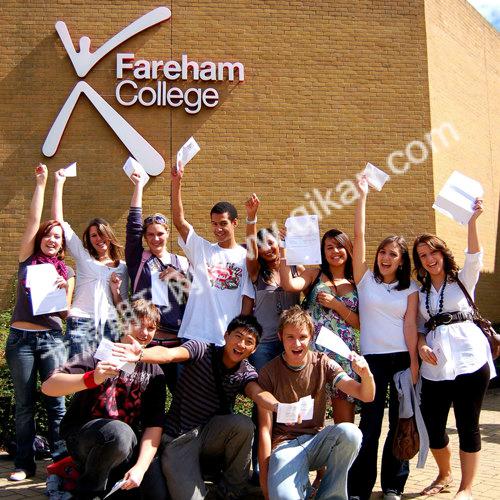高中毕业何去何从?
2009-09-14

This month, a new crop of college students enters university. If you're among them, no doubt you sweated and endured to pass your final exams, and felt a flush of pride when you got the paper admitting you to university. The Chinese examination system, where everything depends on one final set of exams, is a model used by several other Asian countries, such as Korea and Japan.It's generally seen as placing far too much stress on high school students, however, and not evaluating their character and skills outside a narrow knowledge base. So what's the admissions process like in other countries? What do European and American students have to go through?
本月,一批大学新生走进了大学。如果你是其中一员,那你肯定已经吃苦流汗通过了最终考试,在拿到大学录取通知书时感到一阵由衷的自豪。中国的考试体制是终考一锤定音,这种体制也为韩国和日本等多个亚洲国家所采用。然而,人们普遍认为这带给高中生的压力太大,考察的知识面狭窄,而且没有评估其人格和技能。那其他国家的大学是如何录取的呢?欧洲和美国的学生需要经历什么呢?
Getting In!
金榜题名!
America has a confusing and complicated admissions system for university, and students can take a wide variety of courses and tests to qualify. A student's high school grades matter, of course, especially if they're received special honors like valedictorian (the highest scoring student in a class, who gives the graduation speech) but so does their placement on the SAT Reasoning Test – a general intelligence test. (1000+ is an average score on the SAT, 1200+ a good score, 1400+ an excellent score; it's a weirdly marked exam.) Advanced Placement courses – equivalent to a first year college course, and taken by students in their last years of high school – are also important. Competition for the top tier of universities is extremely tough, and extracurricular factors are considered very important; high school students looking to get into an Ivy League school often volunteer for charity work, travel abroad, and work on musical or dramatic projects, hoping to impress the admissions board. Top universities also normally conduct an interview to evaluate students personally.
美国大学的录取体制混乱而复杂,学生可选择多种课程,参加多种考试来达到录取要求。学生的高中成绩当然很重要,尤其是如果他们获得“致告别词者”(由班上分数最高的学生来发表毕业演说)等特别荣誉,但美国大学也很重视学术能力评估考试推理测试,这是一种智力测试。(1000+是平均分数,1200+为良好,1400+为优秀,该考试的计分很奇怪。)高三学生选的大学预修课程(相当于大一课程)也很重要。顶级学府的竞争异常激烈,因此课外因素就变得非常重要,想读常春藤大学的高中生经常主动做义工,到国外旅行,参加音乐或表演活动,希望给招生负责人留下深刻印象。顶尖高校还组织面试,亲自对学生进行评估。

Britain is one of the few remaining developed nations where teenagers have the option to leave school at 16, after they take their GCSEs (General Certificates of Secondary Education.) Most people take 8-10 GCSEs, which are graded from F (a failure) to A* - you need at least a C in Maths and English to eventually enter tertiary education, though you can retake the exams later.It used to be quite common for people to leave at 16, especially those who planned to enter manual labor, factory work, or similar, but now only about a quarter of all teenagers do so, and they tend to have considerably lower earnings and job prospects in the future. Of those who stay to take their 'Advanced Levels (A-Levels)', most then go on to university. You normally do 2-5 A-Levels, depending on how much you and the school think you can manage, but nowadays you also do 'AS-Levels', which are half of an A-Level – this lets people cover more subjects. A-Levels are considered equivalent to the first year of a four-year college degree, which is one reason why most British university courses only take three years!
在发达国家中,英国是仅余的几个青少年在16岁的时候可以选择离开学校的国家之一,但前提是学生要拿到普通中等教育证书。大多数人参加8-10门课程的考试,最差成绩为F(不及格),最好为A*,要想最终上大学数学和英语成绩至少要达到C,不过以后也可重考。以前16岁离开学校的现象很普遍,尤其是那些打算做手工活,进工厂,或者从事类似工作的人,但现在只有约四分之一的青少年这样做,而且他们今后的工资和工作前景都比较差。对于留下来参加高级水平考试的学生来说,大多数都会上大学。高级水平考试通常要考2-5门课程,具体要看你自己和学校认为你能应付多少,但现在你还要参加高级补充水平考试,它考察的科目是高级水平考试科目的一半,这样就能覆盖更多课程。高级水平考试相当于四年大学教育的第一年,这也是为什么大多数英国大学只有三年的原因之一。
A-Levels are unusual in that a large percentage of the score is made up of coursework, not graded on the exam alone. The advantage of this is that it's closer to real life work, rather than the very artificial situation of exams. The disadvantage is that it makes cheating easier, especially in some private schools where the school is heavily invested in the students' success, and so gives them more help than the system allows! University admittance depends on A-Levels grades, interviews, and extracurricular work; to get into the two top universities, Oxford and Cambridge, you normally need not only first-class grades, but to endure a very rigorous and intellectual set of interviews.
高级水平考试特殊之处在于,分数很大程度上是由作业组成,而非只是考试成绩。它的好处在于贴近真实,而非考试这种人为的情况。不足之处在于,它使抄袭变得更加容易,尤其是在一些私立学校,它们非常仰仗学生的成功,给学生提供的帮助已超过体制的允许范围!大学录取取决于高级水平考试成绩、面试和课外作业;要进入牛津和剑桥这两所顶级学府,你不仅要有一流的分数,还得通过一系列非常严格而有难度的面试。

The French system is another model widely copied throughout Europe. Between 16-19, students complete the baccalaureat course, choosing to specialize in either sciences, humanities, or social and economic sciences. Final scores are determined through a weighted system, whereby scores in certain subjects – such as philosophy and French literature in the humanities course, or mathematics and physics in the science course – count much more highly towards the final grade. The Germans have a similar system known as the abitur. University admittance largely depends on the grade you receive in these examinations, although the schools do take other factors into account. The Australian HSC (High School Certificate) is also built along these lines, although the grades within in are not fixed, but are graded relative to other students' performance. Under these systems, the most prestigious courses, such as medicine, generally require very high scores for admittance.
法国的体制又有所不同,并被许多欧洲国家采用。学生要在16-19岁之间完成中学结业证书课程,选择理科、文科或社会与经济学作为自己的专业。最终的分数通过加权系统来计算,各科的分数,比如文科中的哲学和语文,或者理科中的数学和物理,在最终成绩里的比重较高。德国的高中毕业考试与此类似。大学录取很大程度上取决于你这些考试的成绩,不过学校也参考其他因素。澳大利亚的高中毕业证书考试也是如此,但是分数不固定,要根据其他学生的表现来定。依照这些制度,医学等最热门的专业通常要求的分数非常高。
Most universities worldwide also accept the international baccalaureate (or IB), an excellent international course designed to emphasize critical thinking and a global perspective. It's a broader course than most, and includes, unusually, a component where students have to work with local communities doing charity, education, or development work. A growing number of schools in the UK, US, and Europe offer the IB as an alternative.
全世界大多数大学也接受国际文凭大学预科课程,这是一套优秀的国际课程,强调批判思维和国际视野。它比大多数课程都宽泛,通常学生还要在地方社区做慈善、教育或发展工作。英国、美国和欧洲有越来越多的学校提供国际文凭大学预科课程供学生选择。
Who Pays?
学费谁来掏?
America is, as usual, an exception among developed countries in having relatively little financial support for students in tertiary education. In most European countries, university – for local students – is either free or heavily subsidized. For instance, students in the UK pay three thousand pounds every year towards their tuition costs, about 25% of the total, and the rest is paid for by the government. Even these costs, though, aren't paid by every student; poorer families pay less, or nothing, depending on the income of the parents, and certain courses where the country badly needs graduates, such as teaching or nursing, are entirely free – in fact, if you already have a university degree, the state will pay you to take the teacher training course!
美国仍是一贯地不同于其他发达国家,对大学生的资助相对较少。在大多数欧洲国家,本国学生念大学要么是免费,要么会得到大笔的资助。比如,英国学生每年只需交3000英镑的学费,这相当于总金额的四分之一,其他则由政府承担。即使这部分钱也不是每个学生都要交;根据其父母收入情况,家庭困难的学生交的少,或者不用交,一些国家急需毕业生的专业是完全免费的,如教师和护士。其实,如果你已经拥有大学学历,国家将资助你参加教师培训课程!
In America, students at state universities have some of their costs paid by the state government, but there is no public support for private universities – which include some of the most prestigious schools in the country! Generally speaking, the more famous the university, the heavier the tuition fees; costs range from $5000, at the very low end, to $35'000 or $40'000 a year. Combined with heavy living expenses, this makes university a crippling financial burden for many American families, who often start 'college funds' for their children as soon as they're born. It's normally possible to obtain 'student loans' to cover the costs, but this leaves new graduates with the burden of paying back these loans, often starting their working lives with $100'000 or more in debt. However, American universities, especially the top ones, are also normally richer, and so there are many, many more scholarships available to students. A really first-rate student can 'write their own ticket' - schools will compete to offer them generous scholarships! Because college sports are a huge deal in America, with a great deal of money involved, athletic scholarships are also common.
在美国,国立大学学生的学费部分由政府承担,但私立大学没有公共资助,包括国内一些著名学府都没有!一般来说,学校名气越大,学费就越高,学费最低为每年5000美元,最高可达35000或40000美元。加上生活成本昂贵,大学成了许多美国家庭沉重的负担,孩子一出生家里就开始设立“大学基金”。一般来说可以通过“学生贷款”来解决学费,但这造成毕业生承受巨大的还贷压力,他们刚开始工作时就已背负至少10万美元的债务。不过美国的大学,尤其是顶尖学府,一般都很有钱,所以会提供很多奖学金。一名真正的优秀学生能“自行决定”,会有好几所大学争着向其提供丰厚的奖学金!由于在美国大学里体育很重要,牵涉大量资金,因此运动员奖学金也很常见。
Even students in subsidized systems often emerge with a high level of student debt, however, if not as high as in the United States. British students typically come out with ten thousand pounds or so of debt, for example. Living costs can be steep for students, especially if you like to drink or party. Many students work part-time jobs to cover these costs; in the USA, the university itself will often employ students or help find work for them, but elsewhere this generally depends on the student's own initiative. Typical jobs include waiting tables, bartending, tutoring high school students, and, for the athletic, building work.
然而,即使有补贴,许多学生毕业后也是债台高筑,只是没美国那么高罢了。例如,英国大学生毕业时一般有1万英镑左右的债务。学生的生活成本也很高,尤其是如果你喜欢喝酒或参加聚会。许多学生都做兼职来负担这些花费;在美国,大学经常雇佣学生,或者帮助他们找工作,但在其他地方,这主要取决于学生自己的意愿。学生的兼职工作一般为餐厅服务员、酒吧服务员、高中生家教,对于体育特招生,则是健身教练。
What are the Best Schools?
最好的学校有哪些?
In the UK, Oxford and Cambridge are the oldest, and most famous, universities, and 'Oxbridge' graduates are unusually well represented in politics, finance, and academia as a whole. Other well-known universities include Edinburgh, London, Manchester, Durham, and St. Andrews. In the US, the top schools include Harvard, Yale, Princeton, Stanford, Berkeley, MIT, and Columbia; a large number of these are in the Northeastern USA, where the first English colonies were. In France, the Parisian Universities are among the most famous. Confusingly, there are 13 different, and autonomous, universities in Paris! The most prestigious is 'Paris IV', more commonly known as 'the Sorbonne.' In German, Heidelberg, Munich, Bonn, Freiberg, and Goettingen are especially famous.
在英国,牛津和剑桥是历史最悠久、名气最大的大学,“牛津与剑桥”的毕业生通常都是政治、金融和学术界的精英。其他著名学府有爱丁堡大学、伦敦大学、曼彻斯特大学、杜伦大学和圣安德鲁斯大学,等等。在美国,顶级学府有哈佛大学、耶鲁大学、普林斯顿大学、斯坦福大学、伯克利大学、麻省理工学院和哥伦比亚大学,许多都位于美国东北部,即首批英国殖民地的所在地。在法国,巴黎大学是最著名大学之一。但令人困惑的是,巴黎有13所独立的大学!最有名的是“巴黎第四大学”,又称“索邦大学”。在德国,海德堡大学、慕尼黑大学、波恩大学、弗赖贝格工业大学和哥廷根大学尤其知名。
